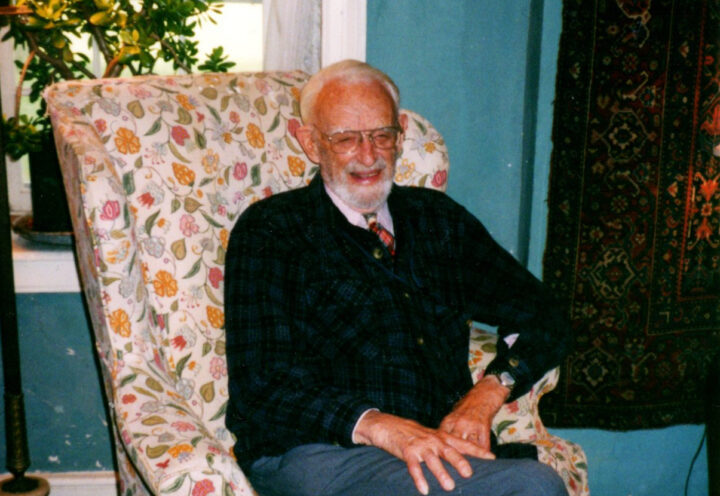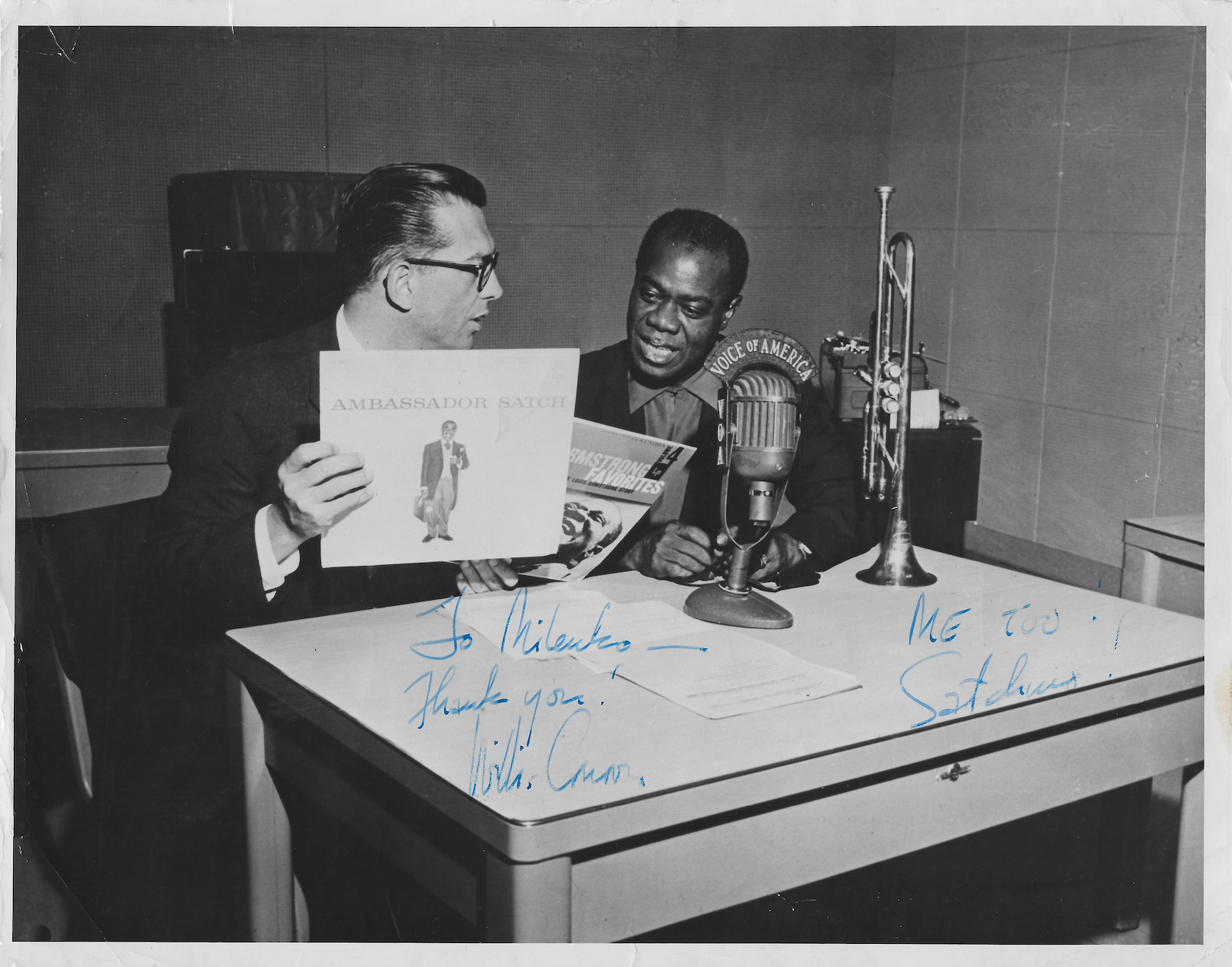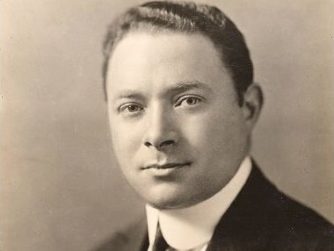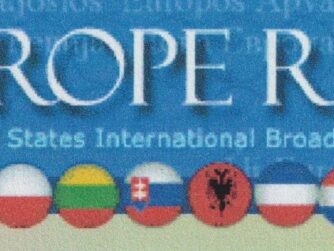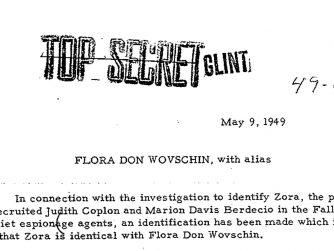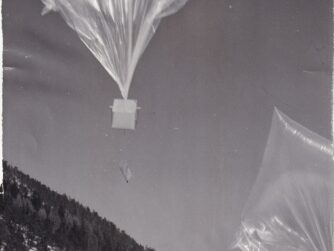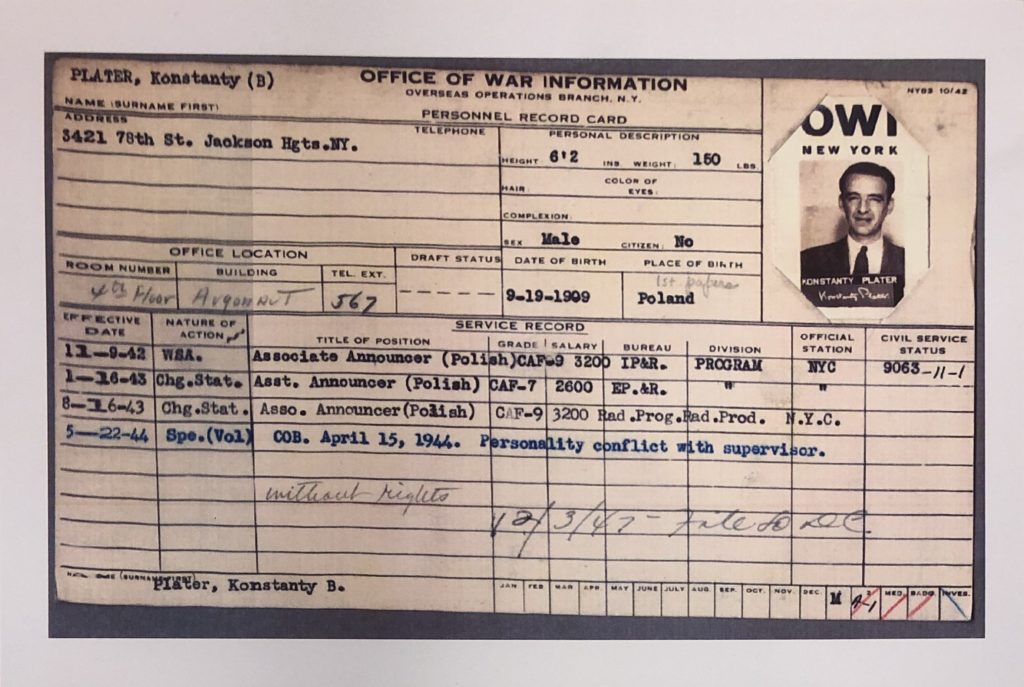
By Ted Lipien
We know of only one Voice of America (VOA) journalist, Konstanty Broel Plater, who resigned from his job at the U.S. government radio station during World War II in protest against the orders from the VOA management and the editors in the Office of War Information (OWI) in New York and Washington to broadcast Soviet propaganda lies. At the time of his resignation, Broel Plater was a Polish aristocrat with a law degree from the prestigious Warsaw University and a former young Polish diplomat in the United States. He was also an experienced radio broadcaster who wrote and voiced Polish-American programs for radio stations owned by Columbia Broadcasting System and General Electric before his employment at the Voice of America.
A Jewish-Austrian editor at OWI, Julius Epstein, who, while working for the German Service, also protested against Soviet propaganda in wartime Voice America broadcasts, did not resign but was fired by the management in 1945 under the pretext of staff reductions. Epstein later helped to expose to members of the U.S. Congress (the bipartisan investigation chaired by Rep. Ray Madden D-IN and known as the Madden Committee) the censorship by the Voice of America’s management, editors, and journalists of the Katyn massacre story from 1943 until about 1951.
During the Second World War and until about 1951, VOA censored reports that the Soviets were responsible for the 1940 murder of about 22,000 Polish military officers and intellectual leaders in Katyn and at other locations in the Soviet Union. Before his resignation, the OWI office in Washington warned Konstanty Broel Plater not to pick a fight with the Voice of America director over VOA’s pro-Soviet programming. A few years before his death, Broel Plater told a Polish-American journalist, who interviewed him at his home in Pennsylvania, that while he worked as a Voice of America announcer in New York, a representative of the Washington office came to see him to discourage him from criticizing VOA broadcasts supporting Soviet propaganda. In a short conversation, the Office of War Information manager asked him after inviting him to lunch whether he intended to fight with the President of the United States and the Voice of America director. Even after being warned, Broel Plater struggled with the U.S. government’s radio station’s intensifying pro-Soviet propaganda by pointing out lies and complaining to his supervisors. As a result, working conditions were made worse for him. He was allowed only to work at night and only to voice the program. The effective date of Broel Plater’s voluntary resignation as an announcer of the Polish Service of the Voice of America was April 15, 1944. The Broel Plater family motto was Melior Mors Macula (“Better Death Than Blemish”).
Konstanty Broel Plater had many famous family ancestors. Some fought in Poland’s anti-Russian insurrections in the 19th century and significantly contributed to preserving the country’s cultural heritage under foreign occupation. Count Tadeusz Broel Plater was a marshal of the Polish-Lithuanian nobility in the district of Vilnius in Lithuania. He married Rachel Kosciuszko, niece of Tadeusz Kosciuszko, the famous Polish general and a hero of the American Revolution. Another family ancestor Emilia Plater became famous and sometimes referred to as Poland’s Joan of Arc for fighting against the Russian occupiers in the failed November 1830 Uprising. The Broel Platers also produced other Polish and Lithuanian military leaders, politicians, entrepreneurs, and early photography and film pioneers in Poland.
Broel Plater grew up at the family estate in Białaczów during Poland’s independence in the interwar period. After earning a law degree from the prestigious University of Warsaw in 1936, he joined the Polish diplomatic service in 1938. The same year, he was assigned to the Polish Consulate in Pittsburg, PA. At the time, he spoke fluent French but practically no English. As a younger son who could not inherit the family estate, his professional choices were limited to becoming a priest or a diplomat.
Movie fans may be interested to know that the Broel Plater family’s former manor house in Białaczów, in central Poland, confiscated first by the Germans during World War II and by the Communists after the war, can be seen in the 2018 Oscar-nominated Cold War film by Paweł Pawlikowski whose film Ida won the 2015 Academy Award for Best Foreign Language Film. In Cold War, the director included a short reference to Radio Free Europe (RFE), a radio station also U.S. funded, which—unlike the wartime Voice of America—never lied about communist crimes or tried to cover them up with Soviet propaganda.
World War II and communism wiped out the Broel Plater family’s fortune in Poland. His father, Zygmunt Broel Plater, died in 1934. His mother, Anna Brzozowski Plater, and his six sisters lived in poverty in Poland during the war, although they could have claimed to be of German origin and received privileged treatment. His older brother, Ludwik Plater, was a prisoner of war in Nazi Germany. One of his relatives, Maria Broel Plater, was a prisoner in the Ravensbrück German concentration camp where she was subjected to medical experiments by Nazi doctors.
Had the family been from the part of Poland occupied in 1939 by the Soviet Union under the Hitler-Stalin Pact (Molotov–Ribbentrop Pact), they would have faced deportations to the Gulag slave labor camps. His brother might have been executed in the Katyn Forest massacre. This was the fate of about 22,000 Polish military officers, Polish government employees, and intellectual leaders who were murdered in the spring of 1940 by the NKVD Soviet secret police on the orders of Stalin and the Soviet Politburo. Still, information about such communist atrocities was carefully hidden by Soviet sympathizers and Communists working for the Voice of America during World War II. The Soviet Katyń massacre propaganda lie, accepted at face value and promoted by VOA officials and journalists, was most likely the main cause of Broel Plater’s resignation from VOA in 1944. However, there is no document showing that it was the decisive factor. His official OWI records only reference a “personality conflict with supervisor.”
Voice of America’s programs during World War II, when Konstanty Broel Plater worked there from late 1942 until April 1944, were quite different from Radio Free Europe’s and VOA’s broadcasts supporting freedom and democracy in the later years of the Cold War. During World War II, VOA operated under various names and functioned primarily as an anti-Nazi and anti-Japanese U.S. government propaganda radio station. Still, its pro-Soviet officials and journalists also turned it into a propaganda outlet on behalf of Stalin and supported in their broadcasts the Soviet takeover of East-Central Europe. VOA’s first chief news writer was Howard Fast, an American communist writer, and future 1953 Stalin Peace Prize winner. Fast was in charge of VOA English news when Broel Plater worked as a Polish-language announcer in the Overseas Branch of the Office of War Information. Fast’s patron, VOA’s first director John Houseman, who hired many Communists for VOA jobs, was quietly forced to resign by the Roosevelt administration, which was otherwise highly pro-Soviet and agreed to Stalin’s post-war domination over East-Central Europe. Some VOA Polish desk members and employees of other Office of War Information units specializing in producing propaganda targeting Poland and Polish speakers were radical socialists. Some later worked as anti-American propagandists for the regime imposed on Poland by the Soviets. In the late 1940s and the early 1950s, the Truman administration replaced them at the Voice of America with refugee journalists such as Zofia Korbońska. However, they still had to struggle with limited censorship by the VOA management of some of the reports of communist crimes and criticism of the Soviet Union until 1981, when President Ronald Reagan’s administration changed VOA’s leadership and eliminated such restrictions at the Voice of America.
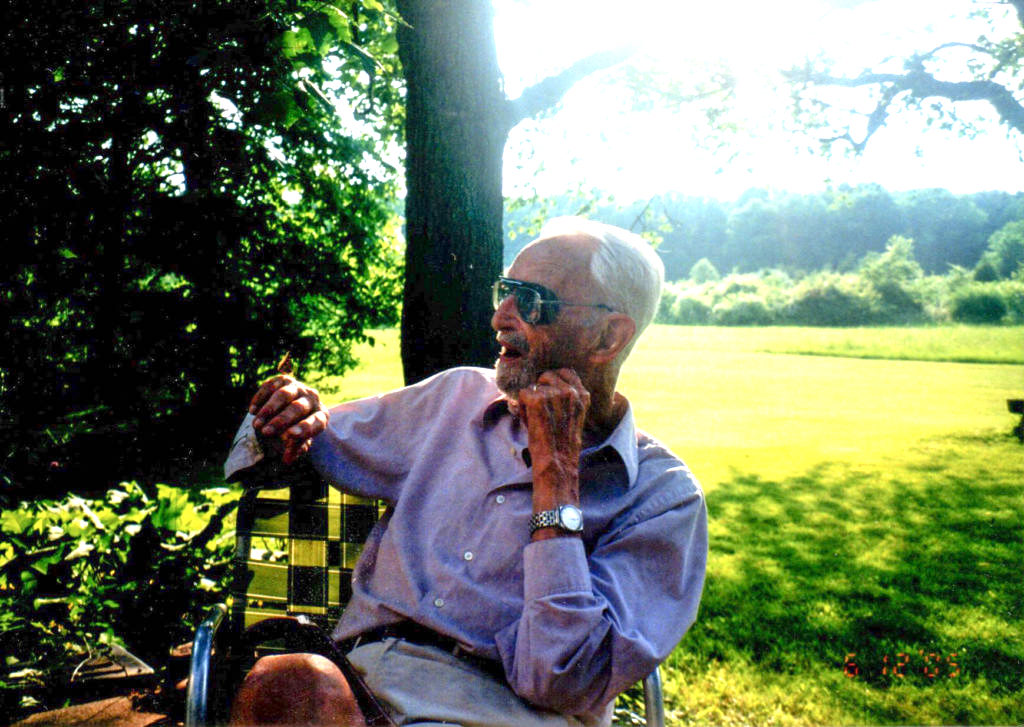
Memories of Konstanty Broel Plater
by Elżbieta Palms
I met Mr. Plater in May 2000.
At that time, I was working at the publishing house of the Czech Brethren in Bethlehem, Pennsylvania.
The receptionist, Mrs. Alma Elo (still living, 95 years old; she and I keep in touch), approached me one day, saying that the husband of her good (deceased) friend is also from Poland and apparently “even a count.” She remembered his name, “Plater.”
I confirmed that it was one of Poland’s most famous aristocratic families.
Mrs. Elo decided to arrange for us to meet. She said that Mr. Plater greatly missed contact with Poles. I gave her my phone number and the next day Mr. Plater called.
He introduced himself in English, and when I suggested switching to Polish, there was a moment of silence. Next, I heard his emotion-filled voice: “Dear lady, you cannot even imagine how lucky I am to speak Polish with you. I haven’t had the opportunity for so long….”
He told me a bit about himself, his children, his late wife, and his life on an old farm in Kintnersville, Pennsylvania.
He spoke in beautiful Polish, a bit old-fashioned, “pre-war.”
He warmly invited me to visit him at his farm. He apologized and explained that he did not venture further than to shop and to the nearby church for Sunday Mass. “Dear lady, I’m 90 years old, so if it’s not too much trouble for you, I cordially invite you to my place.”
I took advantage of the invitation the following weekend, having previously checked on the map how to get there.
An old, two-story house stood on the edge of a vast meadow surrounded by a forest. Large linden and larch trees, planted years ago by Mr. Plater, grew on the property to remind him of the family estate in Białaczew, Poland.
Mr. Plater spoke with great emotion about his family and the years spent in Poland until he left the country in 1938. Sensing the impending war, his mother insisted on his departure to protect at least one of her sons. Thanks to his legal studies and family connections, he managed to get a job as the third secretary at the Polish diplomatic mission in New York. At the time, he did not speak English at all, but the language of diplomacy was then French, so no one saw any problems.
Mr. Plater talked about the people and the places he knew: Polish pianist and statesman I. J. Paderewski, poet and Polish Army general Wieniawa-Długoszowski, the pre-war Warsaw. I asked if he recorded these memories in a diary or other notes for posterity. “Oh, dear lady, my life was so uninteresting; who could be interested in it.” … And he began another fascinating story.
He was exceptionally modest, which always goes hand in hand with true greatness and noble character.
When I met him, he was 91 years old. Still physically fit, he lived alone on the old farm, mowing grass, cooking, shopping, and looking after the flowers in the garden planted by his late wife. He was assisted in heavier work by his youngest son, Marek, who lived half an hour away.
It was a great joy for Mr. Plater to take care of several beehives from which he collected delicious honey.
His mental alertness was astonishing. Not only did he perfectly remember the classics of Polish literature, but he was also up to date with contemporary books, among others, by British historian Norman Davis. His family in Poland provided him with the latest publications. He was very interested in events in Poland and asked about everything.
We kept in touch by phone. Whenever possible, we visited Mr. Plater, the three of us (my friend Alicja, and her cousin, Teofil Lachowicz, an archivist of the Polish Institute in New York). Probably in 2002, Mr. Plater got a computer and proudly sent his first email.
Our visits gave him visible joy. There was no end to the stories and anecdotes, and when we started singing (“O My Rosemary” or “Laura and Filon”), he joined us in a voice breaking with emotion. There were also religious songs. Mr. Plater was a man of deep faith and was very happy that he found a common language with us in matters of religion.
We treated him with great respect as a representative of a disappearing, almost mythical generation for us, someone who represented Poland’s best values.
Our respect turned into admiration for his steadfast attitude when he told us about his work for the Voice of America, the U.S. government broadcaster with programs for overseas audiences. He was hired as a radio announcer, probably in 1942, and it was for him a “gift from heaven.” Finally, a stable job offered stability for the young couple.
The joy of his work was marred by the fact that more and more, the radio scripts he read were adapted to the rule: “don’t irritate Uncle Stalin,” and did not necessarily reflect the truth about the situation in Europe, especially in the countries occupied by the Soviets.
When one day, he was given a text to read about Katyn, informing the audience that the Germans rather than the Soviets had committed this terrible crime, Mr. Plater protested that he would not read such lies. He was told that someone else would read the script and that he could look for another job.
“I had lost a great job but couldn’t do otherwise. It would be against my conscience, against the rules my parents raised me with.”
It was not easy for him to find satisfying work in post-war America. He did various odd jobs and came across a dilapidated farm near Philadelphia. The wife’s parents (who moved to their farm in their old age) helped purchase the property.
We saw what the farm looked like in the old photos. Pieces of the roof, completely rotten floors. It needed a lot of work. Mr. Plater worked a night shift as a manual laborer at a nearby paper mill to cope with the renovation. (“They paid more, and I could renovate the house during the day.”) The other workers at first teased him about being “the count,” but he didn’t mind.
After a few years, he renovated the house and was promoted to the technical department at the paper mill. In the summer, together with their three children, they collected linden flowers and herbs, dried them, and sold them. With this money, they could send packages to their family in Poland. The children were excellent students, each winning a scholarship and a place at renowned universities. The eldest son, a law professor at Boston College, has recently retired.
His beloved wife died in 1986.
We visited Mr. Plater regularly until probably 2005 when the children bought him a place in the Catholic Senior Home in Bethlehem. Despite their insistence, he did not want to live with any of the children to not “be a burden to them.”
He died on June 14, 2007, 3 months before his 98th birthday.
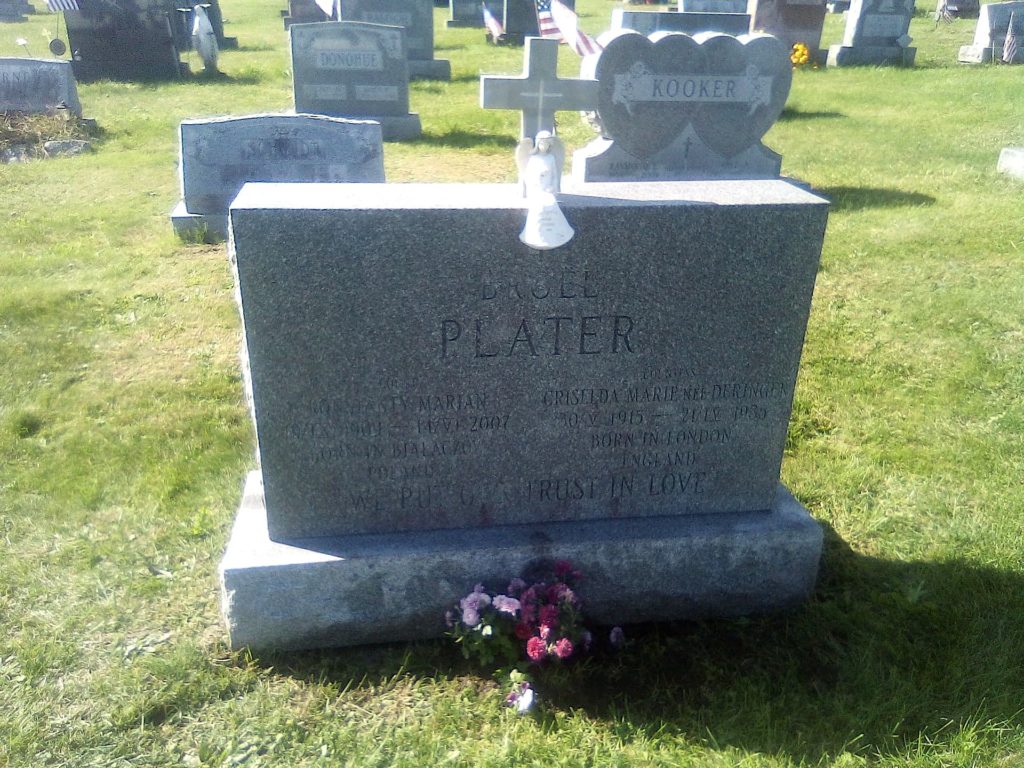
Elżbieta Palms is a graduate of Warsaw University with a degree in German philology. After working as a lecturer at Warsaw University, she emigrated to the United States in 1987 and taught at various American colleges.
Polski radiowiec zrezygnował z pracy w Głosie Ameryki nie chcąc nadawać sowieckich kłamstw o Katyniu
Znamy tylko jednego dziennikarza Głosu Ameryki (Voice of America – VOA), Konstantego Broela Platera, który w czasie II wojny światowej zrezygnował z pracy w amerykańskiej rozgłośni rządowej dla zagranicy w proteście przeciwko zmuszaniu pracowników przez kierownictwo VOA i redaktorów Biura Informacji Wojennej (Office of War Information – OWI) w Nowym Jorku i Waszyngtonie do nadawania kłamstw sowieckiej propagandy. Datą wejścia w życie jego dobrowolnej rezygnacji jako spikera polskiej sekcji Głosu Ameryki był 15 kwietnia 1944 r. Redaktor OWI, Julius Epstein, uchodźca żydowski z Austrii i przez krótki czas w latach studenckich członek partii komunistycznej a później antykomunista, który pracując w sekcji niemieckiej w czasie wojny, również protestował przeciwko sowieckiej propagandzie w audycjach Głosu Ameryki, nie zrezygnował z pracy, ale został zwolniony przez kierownictwo w 1945 r. pod pretekstem reducji personelu.
Wspomnienie Elżbiety Palms o Konstantym Platerze

Pana Konstantego poznałam w maju 2000 roku.
Pracowałam w tym czasie w wydawnictwie Braci Czeskich w Bethlehem, w stanie Pensylwania.
Recepcjonistka, p. Alma Elo (jeszcze żyje, ma 95 lat i utrzymuję z nią kontakt) zagadnęła mnie któregoś dnia, mówiąc, że mąż jej dobrej (zmarłej) znajomej też jest z Polski, i podobno „nawet hrabia”. Pamiętała jego nazwisko, „Plater”.
Potwierdziłam arystokratyczne pochodzenia i dodałam, że to jeden z najbardziej znanych arystokratycznych rodów w historii Polski.
Pani Alma postanowiła nas poznać. Podobno p. Platerowi bardzo brakowało kontaktów z Polakami. Dałam jej swój numer telefonu i już następnego dnia p. Konstanty zadzwonił.
Przedstawił się po angielsku, a kiedy zaproponowałam przejście na polski, była chwila ciszy, po czym usłyszałam jego wzruszony głos: „Droga Pani, nie wyobraża Pani sobie nawet, jakim dla mnie jest szczęściem mówić po polsku. Tak dawno już nie miałem okazji….”.
Opowiedział mi trochę o sobie, o dorosłych już dzieciach, zmarłej żonie, o swoim życiu na starej farmie w Kintnersville, w Pensylwanii.
Mówił przepiękną polszczyzną, nieco staroświecką, „przedwojenną”.
Gorąco zapraszał na swoją farmę. Przepraszał za kłopot, ale sam już nie wypuszczał się dalej, niż po zakupy i do niedalekiego kościoła na niedzielną Mszę. „Droga Pani, ja już mam 90 lat, wiec gdyby to nie sprawiło Pani kłopotu, serdecznie zapraszam do siebie”.
Skorzystałam z zaproszenia w najbliższy weekend, uprzednio sprawdziwszy na mapie, jak tam trafić.
Stary, dwupiętrowy dom stał na skraju ogromnej łąki, otoczony lasem. Wokół rosły wielkie lipy i modrzewie zasadzone przed laty przez p. Konstantego. Miały przypominać rodzinną siedzibę w Białaczewie.
O rodzinie i latach spędzonych w Polsce p. Konstanty opowiadał z ogromnym wzruszeniem. Opuścił Polskę w 1938 r. Matka, przeczuwając zbliżającą się wojnę, nalegała na jego wyjazd, aby choć jednego syna uchronić. Dzięki ukończonym studiom prawniczym i rodzinnym koligacjom udało mu się zdobyć posadę 3. sekretarza w polskiej placówce dyplomatycznej w USA. Nie znał zupełnie angielskiego, ale językiem dyplomacji był wtedy francuski, wiec nikt nie widział problemu.
We wspomnieniach p. Konstantego przewijały się nazwiska ludzi, których znał: I. J. Paderewski, Wieniawa-Długoszowski, przedwojenna Warszawa. Spytałam, czy utrwalił te wspomnienia w formie dziennika, czy innych zapisków, dla potomności. „O, droga Pani, moje życie było tak mało zajmujące, kogoż by to mogło zainteresować”…I zaczynał kolejna fascynującą historię.
Był człowiekiem niesłychanie skromnym, co zawsze idzie w parze z prawdziwą wielkością i szlachetnością charakteru.
Kiedy go poznałam, miał 91 lat. Ciągle sprawny fizycznie mieszkał sam na starej farmie, jeszcze kosząc trawę, gotując, robiąc zakupy i doglądając kwiatów w ogródku założonym przez zmarłą żonę. W cięższych pracach pomagał mu mieszkający o pół godziny drogi najmłodszy syn, Marek.
Dużą radość sprawiało p. Konstantemu doglądanie kilku uli, z których miał pyszny miód.
Zdumiewająca była jego sprawność umysłowa. Nie tylko doskonale pamiętał literaturę polską, ale był też na bieżąco z książkami np. Normana Davisa. Rodzina w Polsce zaopatrywała go w ostatnie nowości. Bardzo interesował się wydarzeniami w Polsce i wypytywał o wszystko.
Byliśmy w kontakcie telefonicznym, a kiedy to było możliwe, odwiedzaliśmy p. Konstantego, już we trójkę (moja znajoma, Alicja i jej kuzyn, Teofil Lachowicz, archiwista Instytutu Polskiego w Nowym Jorku). Bodajże w 2002 r. p. Konstanty dostał komputer i z dumą przysłał swój pierwszy email.
Nasze wizyty sprawiały mu widoczna radość. Opowieściom i anegdotom nie było końca, a kiedy zaczynaliśmy śpiewy („O mój rozmarynie” czy „Laura i Filon”) dołączał do nas głosem łamiącym się ze wzruszenia. Były też pieśni religijne. P. Konstanty był człowiekiem głębokiej wiary i cieszył się ogromnie, że znalazł z nami wspólny język także w tych sprawach.
Odnosiliśmy się do niego z wielkim szacunkiem jako do przedstawiciela odeszłego, prawie mitycznego dla nas pokolenia, kogoś, kto reprezentuje najlepsze wartości Kraju.
Nasz szacunek zmienił się w podziw dla jego niezłomnej postawy, kiedy opowiedział nam o swojej pracy dla rozgłośni Głosu Ameryki. Został zatrudniony jako lektor, chyba w 1942 r., i był to „dar z nieba”. Wreszcie stała praca, co dla młodego małżeństwa było wymarzoną stabilizacją.
Radość z pracy mącił fakt, że coraz częściej wiadomości, które odczytywał, były wyraźnie dostosowywane do aktualnie obowiązującej reguły: „nie drażnić wujka Stalina”, i niekoniecznie odzwierciedlały prawdę o sytuacji w Europie, a zwłaszcza krajach „wyzwolonych” przez Sowietów.
Kiedy któregoś dnia dano mu do przeczytania artykuł o Katyniu informujący słuchaczy, że tę straszliwą zbrodnię popełnili Niemcy, pan Konstanty zaprotestował, że nie będzie czytał takich kłamstw. Usłyszał, że wobec tego artykuł przeczyta ktoś inny, a on może poszukać sobie innej pracy.
„Straciłem świetną pracę, ale nie mogłem postąpić inaczej. To by było niezgodne z moim sumieniem, niezgodne z zasadami, w jakich wychowali mnie rodzice”.
Nie było łatwo znaleźć pracę w powojennej Ameryce. Znajdował różne dorywcze zajęcia, dłużej pracował dla jakiejś agencji nieruchomości, i tak natknął się na zrujnowaną farmę o godz. drogi od Filadelfii. W zakupie pomogli rodzice żony (którzy na starość przenieśli się do nich, na farmę).
Na starych zdjęciach oglądaliśmy, jak wyglądała farma. Kawałki dachu, spróchniałe zupełnie podłogi, ogrom pracy. Aby temu podołać, p. Konstanty zatrudnił się w pobliskiej papierni, jako robotnik fizyczny, na nocną zmianę („więcej płacili, no i w ciągu dnia mogłem remontować dom”). Na początku inni robotnicy żartowali sobie „z hrabiego”, ale jemu to nie przeszkadzało.
Po paru latach wyremontował dom, a i w pracy awansował do działu technicznego. Latem razem z trójką dzieci zbierali kwiaty lipy i zioła, a ususzone sprzedawali. Za te pieniądze byli w stanie wysyłać paczki do rodziny w Polsce. Dzieci uczyły się świetnie i każde zdobyło stypendium i miejsce na renomowanych uczelniach. Najstarszy syn – profesor prawa na Boston College – przeszedł niedawno na emeryturę.
Ukochana żona zmarła w 1986 r.
Pana Konstantego odwiedzaliśmy wiernie do bodajże 2005 r., kiedy to dzieci wykupiły mu miejsce w katolickim Domu Seniora w Bethlehem. Mimo nalegań nie chciał zamieszkać z żadnym z dzieci, aby „nie być im ciężarem”.
Zmarł 14 czerwca 2007 r., 3 miesiące przed swoimi 98 urodzinami.

Elżbieta Palms studiowała germanistykę na Uniwersytecie Warszawskim i była wykladowczynią języka niemieckiego. Od 1987 roku mieszka w Stanach Zjednoczonych, gdzie również uczyła na kilku uniwersytetach.
Elżbieta Palms is a graduate of Warsaw University with a degree in German philology. After working as a lecturer at Warsaw University, she emigrated to the United States in 1987 and taught at various American colleges.
Fotografia Konstantego Broela Platera z 2003 r. z prywatnej kolekcji Elżbiety Palms.
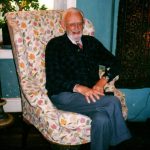
Photo Credit: Konstanty Broel Plater, Voice of America Polish Service broadcaster who resigned in 1944 in protest against VOA’s airing of Soviet propaganda lies. A 2003 photograph courtesy of Elżbieta Palms.


